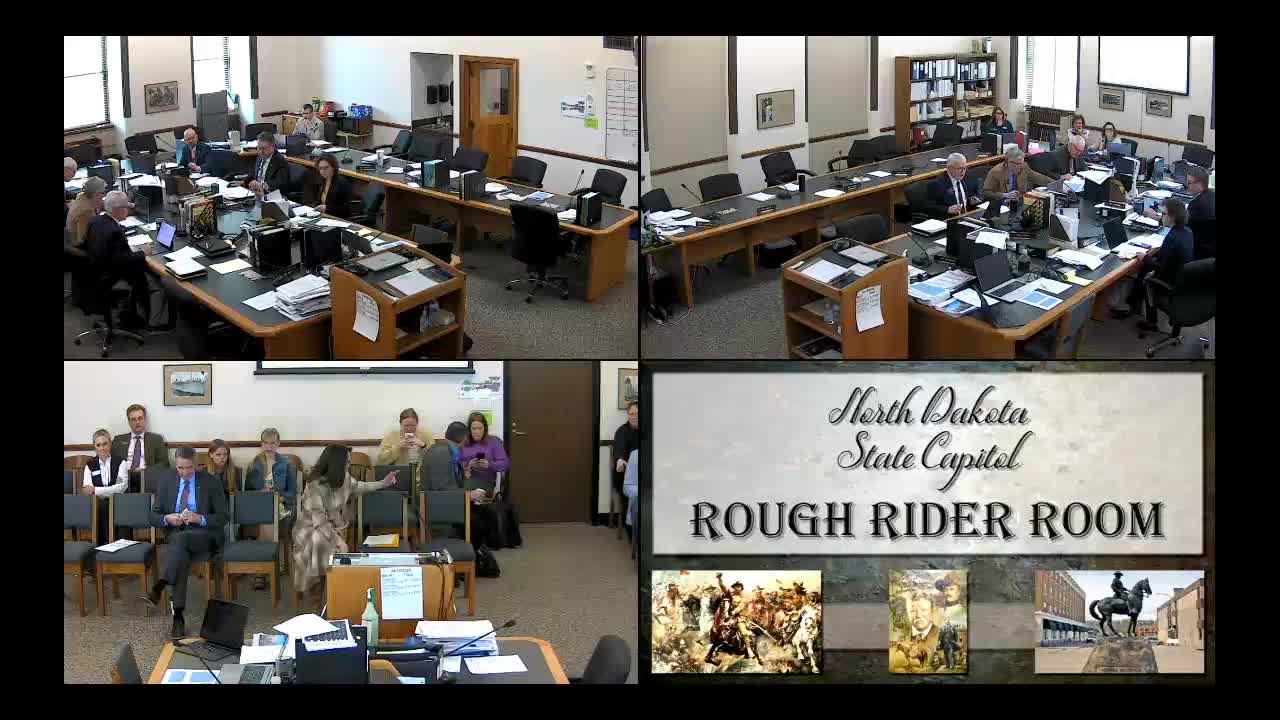Conference committee reviews Senate changes to House Bill 1003; cybercrime agents, litigation fund, task force discussed
Get AI-powered insights, summaries, and transcripts
Subscribe
Summary
Members of the Appropriations conference committee reviewed Senate changes to HB 1003, including adding two BCI cybercrime agents in Grand Forks, shifting $3 million into the Attorney General litigation pool to carry forward, a $685,000 human-trafficking victims grants line, and proposed task force language to study violent crime issues.
Members of the Appropriations conference committee met in a conference on House Bill 1003 to review Senate changes to the bill, discussing staffing, funding source changes, and new program language proposed by the Attorney General’s Office.
The Senate side presented a package of changes that would remove several attorney FTEs, add two Bureau of Criminal Investigation cybercrime agents based in Grand Forks with one-time equipment funding, shift some salary and operating costs from the general fund to the refund fund, and carry over an additional $3 million into the Attorney General’s litigation pool, bringing the available litigation pool to $8 million, according to committee discussion.
Why it matters: The committee’s decisions affect staffing at the Attorney General’s Office, law-enforcement capacity for cybercrime investigations, the size of a litigation reserve used by the state, and new grant funding for human-trafficking education and victim services.
Most significant changes discussed
- Cybercrime agents and equipment: The Senate added two BCI cybercrime agents to be located in Grand Forks and included one-time equipment funding of $161,000. Committee members noted the City of Grand Forks is contributing office space and about $181,000 in related operating and equipment support.
- Litigation pool carryover: The Senate proposal would carry forward a previously appropriated $3,000,000 deficiency payment so that, combined with an existing $5,000,000 base, the litigation pool’s availability would total $8,000,000.
- FTE and classification changes: The Senate removed three attorney FTEs that had been vacant for 18–20 months, but added a $30,000 reclassification to convert one paralegal position to an attorney position. Committee discussion characterized the net effect as the removal of two attorney positions and one paralegal vacancy.
- Salary and equity adjustments: The Senate shifted some salary and operating costs from the general fund to the refund fund for certain lines after consulting with Attorney General staff about fund balances. The package also included a $2,500 salary equity increase line and about $254,000 intended to raise starting or junior attorney pay to better match benchmarks across other North Dakota agencies.
- Human-trafficking grants: The Senate added $685,000 for human-trafficking victim grants and education tied to Senate Bill 2330. Representative Lausser asked why the conference figure was so much larger than the $48,000 placeholder that had been included earlier. A committee member said the larger number came from organizations that would apply to run the education program and had provided cost estimates for what an implementation would require.
- Electronic smoking vendor fees and staffing: The Senate added fee language for electronic-smoking vendor applications and annual licensing—$2,000 for an application fee and $500 annual fee—to help cover the cost of one FTE tied to program administration.
- Retired law-enforcement dogs: The Senate removed $110,000 that the House had included for a retired law-enforcement dogs program.
Task force language proposed by Attorney General’s Office
Deputy Attorney General Claire Nuss presented an amendment to create a task force to study violent-crime and related law-enforcement issues, with membership to include law enforcement, the Department of Corrections and Rehabilitation, the Parole Board, judges (or a former judge), state's attorneys, legislators and other stakeholders. Nuss said the AG’s office would provide administrative support and funding for travel for non-state employees.
“The amendment that you have in front of you is for a task force to look at various law enforcement issues and violent crime related issues,” Deputy Attorney General Claire Nuss said during the meeting.
Senator Dwyer expressed concern about balance on the proposed task force, saying the panel “seems to be driven from one particular point of view” and suggested adding more Department of Corrections representation. Nuss responded the office would be open to adding more DOCR members. Committee members also noted potential overlap between the proposed task force and a separate legislative study focused on sentencing, corrections and parole oversight; Nuss said the task force language was intended to solicit input from a broader set of stakeholders than the legislative study.
Process and next steps
No formal committee votes on these changes were recorded during the session; senators and representatives reviewed the Senate’s proposed changes and the committee agreed to take the amendments back for further review before reconvening. The chairman closed the conference committee on House Bill 1003 and indicated members would meet again on Monday to consider any additional amendments.
Ending
The conference review consolidated several personnel, funding-source and programmatic changes proposed by the Senate for HB 1003 and introduced task-force language from the Attorney General’s Office for further consideration. Committee members said they will continue review and meet again to finalize conference language.
